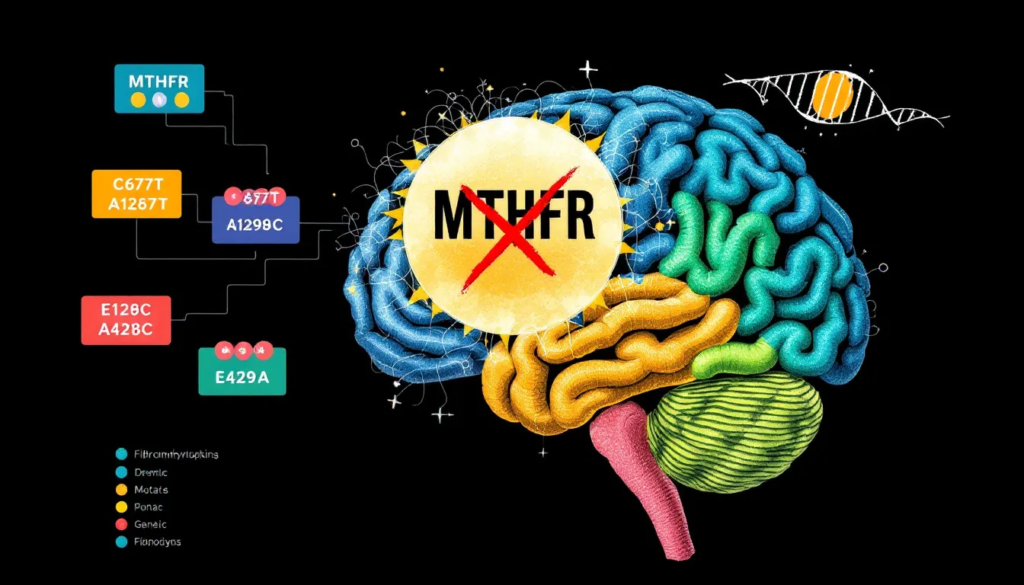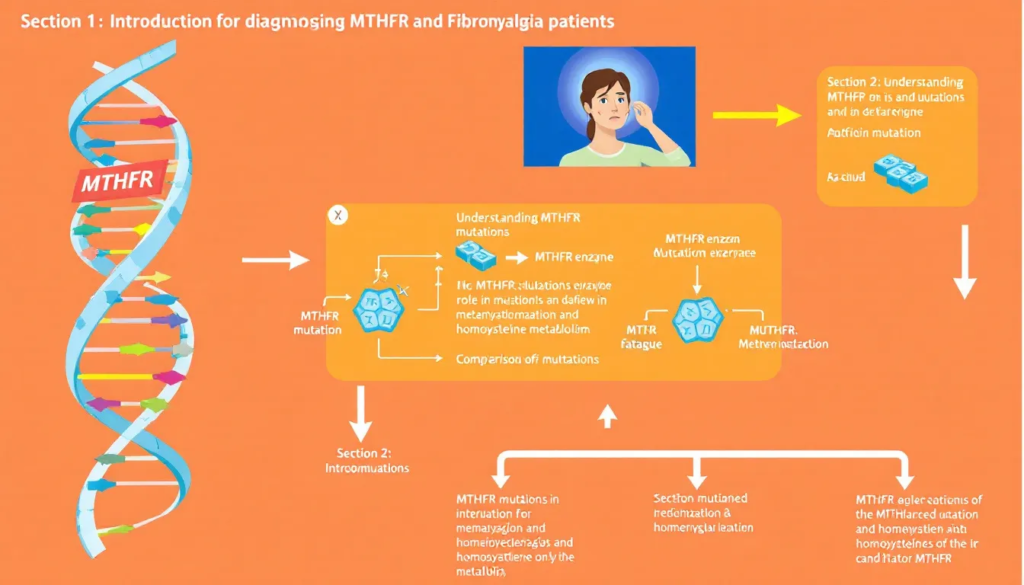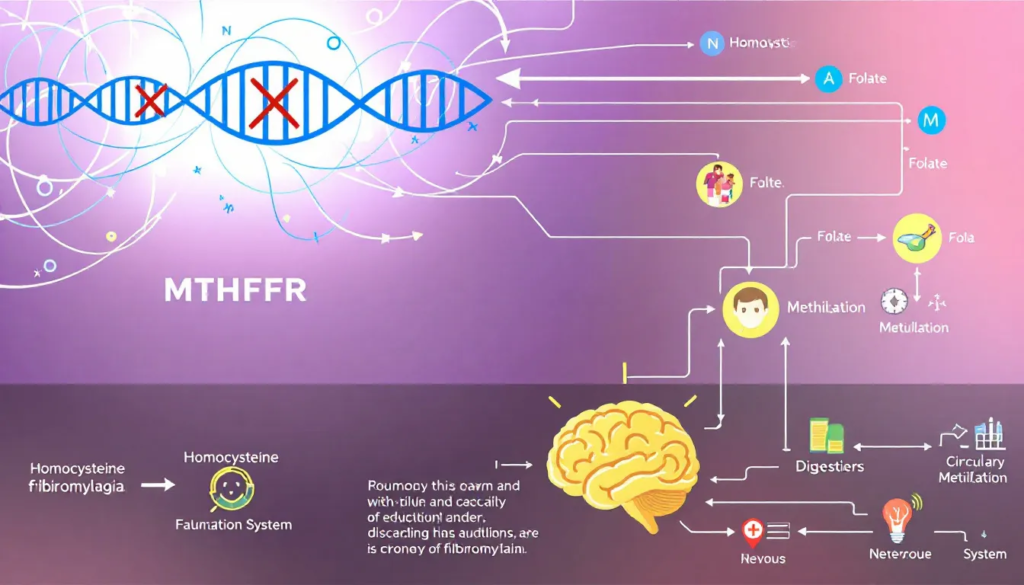How do MTHFR gene mutations impact fibromyalgia? This article explores the link between MTHFR and fibromyalgia, showing how genetic variations can influence symptoms and treatment options. Learn about the role of the MTHFR gene, common mutations, and how they might worsen fibromyalgia symptoms. We also cover how to diagnose and manage fibromyalgia with these genetic insights.
Key Takeaways
MTHFR gene mutations, particularly C677T and A1298C, are associated with increased risk and severity of fibromyalgia symptoms, affecting processes like neurotransmitter production and inflammation.
Testing for MTHFR mutations can lead to tailored management strategies, including dietary adjustments, supplements, and lifestyle changes, significantly enhancing treatment outcomes for fibromyalgia patients.
Research continues to reveal the connections between MTHFR mutations and fibromyalgia, though gaps remain in understanding the precise mechanisms, highlighting the need for further studies to explore a wider array of genetic factors.
The Role of MTHFR in Fibromyalgia

Fatigue is often the hallmark of fibromyalgia, a condition that significantly diminishes the quality of life. The MTHFR gene is essential for folate metabolism and methylation, key processes for bodily functions. Mutations in the MTHFR gene can disrupt these processes, potentially worsening fibromyalgia symptoms. Depression and anxiety, common in fibromyalgia, further complicate chronic pain, highlighting the need to understand all contributing factors.
The methylenetetrahydrofolate reductase gene significantly influences how our bodies handle essential nutrients and maintain overall health. Variations in fibromyalgia syndrome, influenced by MTHFR mutations, offer new insights into managing and treating this debilitating condition.
What is the MTHFR Gene?
The MTHFR gene produces an enzyme crucial for folate use and the methylation process. This enzyme, methylenetetrahydrofolate reductase, is key in detoxification, energy production, mood balancing, DNA repair, and inflammation control. Defects can lead to health issues like migraines, chronic fatigue, and cardiovascular problems.
For those with MTHFR mutations, supplements like methylated forms of B vitamins can be beneficial. Methylfolate, the active form of folate, bypasses the need for the MTHFR enzyme, providing a viable solution for these genetic variations.
Common MTHFR Mutations
The two primary MTHFR mutations are C677T and A1298C. These mutations are the most prevalent methylenetetrahydrofolate reductase gene variations found in the population. Testing for these specific MTHFR mutation is common practice when evaluating for MTHFR gene variations.
Understanding these common mutations helps us grasp how they might contribute to fibromyalgia syndrome and related health conditions. This insight is crucial for developing targeted therapies tailored to the genetic makeup of fibromyalgia patients.
How MTHFR Mutations Affect Fibromyalgia Patients
Individuals with MTHFR mutations may experience heightened pain sensitivity and an increased risk of chronic inflammation, significant factors in fibromyalgia. Genetic variations can profoundly influence the development and severity of fibromyalgia symptoms, particularly those affecting neurotransmitter regulation.
The fibromyalgia impact questionnaire highlights these symptoms, offering a comprehensive view of how genetic mutations exacerbate the condition. This understanding allows for more personalized and effective treatment plans.
Genetic Polymorphisms and Fibromyalgia

Genetic polymorphisms, particularly involving the MTHFR gene, play a significant role in fibromyalgia syndrome. The MTHFR gene affects neurotransmitter production, influencing mood and pain perception—critical components in fibromyalgia. Testing for MTHFR mutations can help assess risks associated with elevated homocysteine levels, linked to chronic inflammation and pain.
Exploring how these genetic variations impact fibromyalgia patients deepens our understanding and opens new avenues for treatment and management. This knowledge is essential for developing comprehensive care strategies that address fibromyalgia’s multifaceted nature.
Single Nucleotide Polymorphisms (SNPs)
Single Nucleotide Polymorphisms (SNPs) are variations at a single position in a DNA sequence among individuals, linked to various medical conditions, including fibromyalgia. These genetic defects can lead to health issues like fatigue, migraines, depression, heart attack, stroke, and miscarriage.
Interestingly, physically active carriers of certain MTHFR polymorphisms report lower scores on fatigue, suggesting that SNPs may influence fatigue levels and overall health outcomes. Understanding these nuances can help tailor more effective treatments for fibromyalgia patients.
MTHFR C677T and Fibromyalgia Risk
The MTHFR C677T polymorphism is linked to an increased risk of developing fibromyalgia. Individuals carrying the MTHFR C677 allele are over twice as likely to develop fibromyalgia compared to those with the T allele.
Studies show that individuals with specific MTHFR mutations have higher incidences of fibromyalgia-related symptoms compared to those without these mutations. This information is vital for identifying at-risk individuals and implementing early intervention strategies.
Other Relevant Gene Variants
Genetic variations can significantly influence pain thresholds and susceptibility to chronic pain disorders, including fibromyalgia. For example, the rs4453709 polymorphism in the SCN9A gene is associated with reduced motivation and activity in fibromyalgia patients. The SCN9A gene also interacts with physical activity, affecting mental fatigue levels.
Participants with the AA/GG genotype showed less sedentary behavior and recorded lower scores on the reduced activity dimension of the Multidimensional Fatigue Inventory (MFI). These findings underscore the importance of considering multiple genetic factors in fibromyalgia management.
Diagnosing MTHFR Mutations in Fibromyalgia Patients

Testing for MTHFR mutations is crucial in understanding fibromyalgia symptoms and refining treatment options. Various methods, including blood tests and genetic profiling, can identify these mutations. An accurate diagnosis can significantly influence management and treatment strategies.
Recent studies suggest that MTHFR mutations may contribute to fibromyalgia symptoms, but further research is needed to clarify these relationships. Diagnosing these mutations allows healthcare providers to develop more personalized treatment plans.
Testing Methods
Several methods exist for testing MTHFR mutations, including blood tests, saliva tests, and genetic profiles. Blood samples often identify common mutations like C677T and A1298C. Genetic tests can also use samples from other bodily fluids.
Real-time polymerase chain reaction is one method to detect the MTHFR C677T mutation. For a cost-effective option, services like 23andMe offer genetic testing for $99. These methods provide flexibility and accessibility for patients seeking to understand their genetic makeup.
Interpreting Test Results
Interpreting MTHFR test results, particularly from services like 23andMe, can be enhanced by running the raw data through tools like Genetic Genie. This understanding is crucial for developing effective management strategies for fibromyalgia.
Interpreting MTHFR test results helps understand their implications for fibromyalgia management, essential for tailoring treatment plans to specific genetic profiles.
Clinical Implications
MTHFR testing results can significantly influence treatment choices, such as medication dosages like methotrexate. Consulting a healthcare provider for interpretation is essential for developing a personalized treatment plan.
Understanding the clinical implications of MTHFR mutations allows for more targeted and effective treatments, potentially improving the quality of life for fibromyalgia patients.
Managing Fibromyalgia with MTHFR Mutations

Managing fibromyalgia in patients with MTHFR mutations often involves a combination of dietary changes, supplements, and lifestyle modifications. Positive MTHFR test results indicate the presence of gene changes linked to health issues.
Tailored management strategies addressing both fibromyalgia symptoms and genetic factors can significantly improve patient outcomes.
Dietary Adjustments
Increasing folate-rich foods can support better health outcomes for individuals with MTHFR mutations. A diet rich in folate, including leafy greens, beans, and certain fruits, can enhance health outcomes.
Incorporating folate-rich foods into the diet can improve overall health and mitigate symptoms associated with fibromyalgia. Dietary adjustments are crucial in supporting health outcomes for individuals with these genetic variations.
Supplements and Medications
MTHFR gene mutations can be managed through diet, supplements, and lifestyle changes. Some individuals may be sensitive to MTHFR supplements due to their genetic polymorphisms.
Folate supplementation is an emerging therapy that may help alleviate symptoms for some fibromyalgia patients. Personalized medicine approaches targeting specific genetic profiles are being explored as potential therapies for fibromyalgia.
Lifestyle Modifications
Recent studies indicate that understanding the genetic underpinnings of MTHFR mutations may lead to more effective treatment strategies for fibromyalgia. Lifestyle changes, including improved physical activity and stress management, can significantly enhance the quality of life.
Engaging in regular, low-impact physical activities like walking, swimming, or yoga can alleviate fibromyalgia symptoms and improve overall well-being. Stress management techniques like mindfulness, meditation, and deep breathing exercises can effectively reduce symptoms.
Current Research and Future Directions

Recent studies show a strong correlation between the MTHFR C677T mutation and increased risk and severity of fibromyalgia symptoms. Despite significant progress, unclear pathways of how MTHFR mutations contribute to fibromyalgia require more research to elucidate these connections.
Emerging therapies targeting MTHFR pathways are being investigated, including customized supplementation and lifestyle modifications, to improve fibromyalgia management. These developments hold promise for more effective future treatments.
Recent Findings
General linear models were used to assess gene-phenotype associations, accounting for factors like age, body fat, analgesics, and antidepressants. The statistical analysis was conducted using the R environment version 3.4.1, widely used for statistical computing.
Significant associations in the studies were determined using criteria like p-values lower than Bonferroni’s correction or both p-values and FDR values lower than 0.05. Statistical analysis is crucial for understanding the relationships between MTHFR mutations and fibromyalgia symptoms.
Gaps in Knowledge
Current research has identified links between MTHFR mutations and fibromyalgia but has not fully clarified the mechanisms involved. A significant gap exists in understanding how different MTHFR mutations specifically impact fibromyalgia symptoms, with variations in symptom severity among patients.
Future research should include a broader spectrum of genetic variants beyond MTHFR to explore their potential role in fibromyalgia. Interdisciplinary studies combining genetics with environmental factors are needed to understand fibromyalgia’s multifactorial nature.
Potential Therapies
Increasing folate intake through dietary adjustments can support better health outcomes for fibromyalgia patients with MTHFR mutations. Specific supplements such as methylfolate and vitamin B12 have been recommended for managing symptoms related to MTHFR mutations.
Implementing lifestyle modifications, including stress management techniques and regular physical activity, can significantly improve the quality of life for individuals with fibromyalgia. These potential therapies, tailored to the genetic profiles of patients, offer promising avenues for more effective management of fibromyalgia symptoms.
Summary
Understanding the link between MTHFR mutations and fibromyalgia provides critical insights into managing this complex condition. From the role of the MTHFR gene in folate metabolism and methylation to the impact of genetic polymorphisms on symptom severity, it’s clear that genetics play a crucial role in fibromyalgia. Testing for MTHFR mutations helps in diagnosing and tailoring treatments, while dietary, supplement, and lifestyle modifications offer practical ways to manage symptoms.
As research continues to uncover the intricate connections between genetics and fibromyalgia, we move closer to more personalized and effective therapies. By addressing both the genetic and lifestyle factors, we can significantly improve the quality of life for fibromyalgia patients, providing them with the tools they need to manage their condition effectively and live healthier lives.
Frequently Asked Questions
What is the MTHFR gene and why is it important in fibromyalgia?
The MTHFR gene produces an enzyme essential for folate metabolism and methylation, both of which influence detoxification, energy levels, mood regulation, DNA repair, and inflammation. Understanding its role is important in addressing fibromyalgia symptoms effectively.
How do common MTHFR mutations like C677T and A1298C affect fibromyalgia patients?
Common MTHFR mutations such as C677T and A1298C can exacerbate symptoms in fibromyalgia patients by disrupting metabolic processes, which may result in increased pain sensitivity and chronic inflammation. This highlights the importance of understanding genetic factors in managing fibromyalgia effectively.
What methods are available for testing MTHFR mutations?
MTHFR mutations can be effectively tested through blood tests, saliva tests, and comprehensive genetic profiles, with options like 23andMe providing accessible genetic testing solutions.
How can dietary adjustments help manage fibromyalgia symptoms in patients with MTHFR mutations?
Dietary adjustments, particularly increasing the intake of folate-rich foods like leafy greens, beans, and certain fruits, can significantly enhance health outcomes and alleviate symptoms in fibromyalgia patients with MTHFR mutations. Prioritizing these foods is a beneficial strategy for management.
What are some potential therapies for managing fibromyalgia related to MTHFR mutations?
To manage fibromyalgia related to MTHFR mutations, consider dietary adjustments, supplementation with methylfolate and vitamin B12, alongside regular physical activity and stress management techniques. These approaches can support symptom relief and overall well-being.

